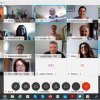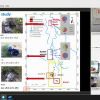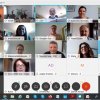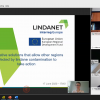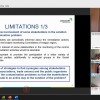LINDANET project meeting and site visit of the Bitterfeld megasite (Germany) also online
From June 16 - 18, 2020 the semi-annual LINDANET Project Meeting took place in the form of an online meeting. Originally, the participants planned to meet for a conference in Magdeburg during this period. However, due to the ongoing SARS-CoV-2 pandemic the host, the State office for contaminated sites (LAF), decided to organize a webinar including a virtual site visit and received a lot of support from the region and the project.
What is LINDANET about?
The Interreg Europe project "LINDANET" is an association of regions which are struggling with lindane and HCH (hexachlorocyclohexane) contaminations and therefore regularly exchange experiences and knowledge in dealing with the persistent organic pollutants. To this end, the first Interregional Thematic Workshop (ITW1) took place in Zaragoza (Spain) in November 2019 and the second Interregional Meeting (ITW2) was supposed to take place in Magdeburg (Germany) in June 2020. However, due to the ongoing SARS-CoV-2 pandemic, the host organised an online meeting instead including a "virtual” site visit with great support from the region and the project. This enabled the online meeting to be attended by several stakeholders in addition to the project partners from Spain, the Czech Republic, Poland and Italy, thus contributing to active discussions and a valuable exchange of experiences.
What was the topic of the meeting?
The first day of the webinar focused on implemented and ongoing technical measures as well as projects related to lindane and HCH contamination. On the second day, the focus was on measures with a positive impact on dealing with HCH exposures and presented limitations and problems in the context of decontamination of HCH contaminated sites. Afterwards possible solutions for the limitations of the other partners were discussed as well as funding opportunities by the European Union.
On the third and last day of the webinar, the host from Magdeburg (Germany) invited the participants to a journey through the historical development of the Chemical Park Bitterfeld-Wolfen in the context of HCH contamination. Therefore, previously recorded videos and live presentations were used. CPG (Chemistry park Bitterfeld-Wolfen) started with a presentation on the general history of the site. Subsequently, videos and lectures were used with the support of MDSE (subsidiary of Saxony-Anhalt, responsible body for remediation in Bitterfeld megasite) and GKW (Joint water treatment plant of the city of Bitterfeld-Wolfen) to present technical measures in Bitterfeld in the context of HCH pollution. A mixture of live talks and videos were also used in the afternoon to discuss the influence of HCH on the floodplain, the handling of HCH loads, implemented and ongoing studies carried out as well as the current course of the partner from Saxony-Anhalt within the framework of LINDANET. The County of Anhalt-Bitterfeld, the UFZ (Helmholtz Centre for Environmental Research) and the consulting engineers CDM Smith, which are involved in the implementation of technical measures at the Bitterfeld-Wolfen site, contributed in the session. In addition, the videos used in the webinar were produced in cooperation with Offener Kanal e.V. (local television channel), which provided a camera team and the technical equipment for editing the video material. Thus, the virtual tour of the site was only possible due to the great support, good networking and excellent cooperation in the region. All points which are encouraged and actively promoted by the LINDANET project.
Resume and learning effects
The feedback from the participants was very positive, which is why the meeting can be considered as a success for the project. The positive outcome is not only due to the great teamwork between the host, the project partners and the region, but also because more participants could be included, by saving travel expenses and therefore invite more stakeholders and external expertise. This promoted an active discussion and successful exchange of experience with HCH contamination during the meeting.
In addition, the use of videos and the need to become creative in getting across information about Bitterfeld, enabled insights to be gained that might have been lost in a personal meeting. All in all, today's video conferencing technology and software opens numerous possibilities for users and should also be used in future meetings. In this way, stakeholders can present their experiences in dealing with HCH contaminated sites and thus sharing first-hand information. In addition, ITW2 has proven impressively that involving external experts can tremendously enrich project meetings. However, there were not only positive aspects about ITW2. The colleagues from the LAF and regional stakeholders were looking forward to the personal meeting and the professional dialogues with the international partners. It is precisely this valuable personal exchange that is missing in an online meeting. During the project meeting in Zaragoza, solutions and experiences in dealing with pollution were exchanged until late in the evening, which was not possible to this extent at ITW2.
Due to the learning effects achieved and the successful professional exchange during the webinar, the participants were generally pleased with the results of ITW2. Nevertheless, it can be assumed all participants hope to implement personal workshops and on-site visits within the framework of LINDANET as soon as the circumstances allow it.

